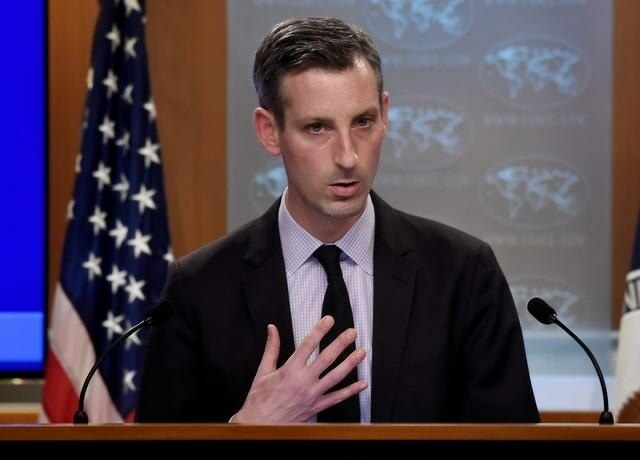State Dept Presser on Aug 16

US State Dept spokesperson Ned Price held a press briefing on Aug 16, 2022.
Some Excerpts
MR PRICE: Good afternoon. I’ve actually come emptyhanded today, so I am at your disposal.
QUESTION: Right. Thank you. Let’s start with Iran. So presumably you’ve had a chance to take a look at their response to the EU text. What do you make of it?
MR PRICE: Well, some of you have heard this from us already today, but we have in fact received Iran’s comments on the EU’s proposed final text. We have received them through the EU. We’re in the process of studying them. We are at the same time engaged in consultations with the EU and our European allies on the way ahead.
All throughout this process, from its earliest days, we’ve taken a deliberate; we’ve taken a principled approach to the negotiations with the remaining JCPOA participants. And more recently, since this deal has essentially been on the table since March, we’ve known what a final deal on a mutual return to compliance with the JCPOA would look like. And I made this point yesterday, but it bears repeating: We agree with the high representative. We agree with Mr. Borrell’s fundamental point. What could be negotiated over the course of these past 16, 17 months has been negotiated.
So, we’ll continue to study what has been submitted. We’ll continue to consult closely with the EU, with our European allies, other partners, and when we have more to say we’ll share that.
QUESTION: When you say what could be negotiated has been negotiated, that would suggest that if Iran doesn’t say yes unreservedly to this text it’s dead.
MR PRICE: Well, this will be up to the EU as the mediator and the arbiter to have a say on that question. But I will make the point that these are not simple issues. These are not issues that can be entertained or tabled with – without, for example, the consultations that we’ve had with the EU over the past several weeks, where the parties have had an opportunity to ask questions of the coordinator to seek additional clarity, to seek additional information, and that’s just because of the very complex and by definition complicated nature of the issues that are on the table.
QUESTION: Iran and North Korea, they cooperate on nuclear programs. Iran also exported their technology to North Korea. How did you assess Iran and North Korea’s cooperations nuclear?
MR PRICE: Well, we’ve released information on this. Some of this information has been reported publicly as well. It’s concerning to see two of the most acute proliferation threats the world faces: the DPRK, a regime that has, of course, already a nuclear weapons program, and Iran, a regime that has advanced its nuclear weapons program in a way – excuse me – its nuclear program in a way that is of concern to us. So any cooperation between countries that have consistently and unapologetically flouted multiple UN Security Council resolutions, the international norms, who have engaged in malign and malicious behavior both in their respective regions and around the world – that’s of course a concern to us.
QUESTION: Three question. One is that Tom West recently has said United State will not support the Afghan central bank anytime soon. What does that mean for Afghan economy? This is the first question.
The second question is Afghan people are still left behind in Afghanistan after Ayman al-Zawahiri is killed. Do you think that U.S. and Afghanistan relationship with the Taliban is still the same? Is still Afghan people can leave Afghanistan?
And also, there are so many singers, Afghan singer, the Taliban destroyed their equipment. They try to leave Afghanistan; they would like to know about U.S. policy and U.S. new program about them.
MR PRICE: Great. So, on your first question, I just want to be very clear that the preservation of the $3.5 billion in Afghan central bank reserves – those funds were preserved for the benefit of the Afghan people. What we are focused on right now are the ongoing efforts to enable those funds, the $3.5 billion in licensed Afghan central bank reserves, to be used for the benefit of the Afghan people. And we’re seeking to find the best mechanism to ensure that those funds can go to the Afghan people in a way that doesn’t risk their diversion from the Taliban or other forces, including to potentially terrorist groups or terrorist actors.
The point Tom West was making is that, owing for the risks I just alluded to, we do not see recapitalization of the Afghan central bank as a near-term option. We’ve engaged Afghan technocrats with the central bank for many months regarding measures to enhance the country’s macroeconomic stability, but we don’t at the present believe that institution, the Afghan central bank, has the safeguards and monitoring in place to manage these – this level of assets responsibly.
And needless to say, to your second question, the Taliban sheltering of now-deceased al-Qaida leader Ayman al-Zawahiri reinforces the deep concerns we have regarding the potential risk of diversion of funds to terrorist groups. So these discussions are ongoing. We want to see these funds into the hands, into the pockets of the Afghan people as quickly and effectively as we can manage, and we’re continuing to work with international partners to devise a way to do that.
On your second question regarding our relationship with the Taliban, there’s no question – well, let me stipulate. We have reason to believe, very good reason to believe that members of the Haqqani Taliban Network were witting of Ayman al-Zawahiri’s presence in Kabul. Certain members of this network took steps to actively shelter him. Of course that is going to have implications for our engagement with the Taliban. I just alluded to one of them. We’re not dismissing that – far from it – as we think about potential options for the $3.5 billion in licensed Afghan reserves.
But we’re thinking through any potential broader implications for our engagement with the Taliban, and we’re doing that for a very simple reason. We’ve always said that our relationship with the Taliban will be predicated on the Taliban’s ability or willingness to comply with the commitments that the Taliban has made to the international community, to the United States, but most importantly to the people of Afghanistan. And there are areas where very clearly the Taliban has been unable or unwilling to comply with those commitments.
Counterterrorism has been one of them, and the fact that the Taliban – members of the Haqqani Taliban Network were actively sheltering Zawahiri I think is an egregious violation not only of those commitments that the Taliban has made but the underlying U.S.-Taliban agreement.
The fact that the Taliban has failed to stand up for, to protect the rights of all of the people of Afghanistan – especially the women, the girls, the religious minorities, ethnic minorities – that, of course, is a failure on the part of the Taliban as well. The fact that the Taliban has failed to put together a government that represents the Afghan people in all of its diversity – that is a failure. So, we are taking a close look at all of these considerations that, of course, will have implications for our engagement with the Taliban.
When it comes to Afghanistan’s culture and the singers that you referenced, there are a number of – well, one, we are doing everything we can to protect and to reinforce the rights of the people of Afghanistan who remain in Afghanistan. And in every engagement, we have with the Taliban, human rights are at the very top of that agenda, and that includes, of course, the human rights of women, of girls, of Afghanistan’s minorities. Our humanitarian assistance is part and parcel of this. We have continued to lead the world in the level of humanitarian funding that we’ve provided directly to the Afghan people – more than three-quarters of a billion dollars since September of last year. We’ve announced $150 million aid just last week in additional assistance for the people of Afghanistan. So, we’ll continue to stand by them as a humanitarian donor and the world’s largest humanitarian donor.
There are some individuals, however, who may seek to depart Afghanistan. That, by the way, is another one of the commitments that the Taliban has made, the commitment to safe passage, to allow those who wish to depart the country the ability to transit freely, to depart freely. We have also stressed that with the Taliban. There are a number of avenues that individuals like the ones you mentioned – singers, other cultural icons – could seek to pursue to leave the country. There of course is the P-1 – so-called P-1 category within the U.S. Refugee Admissions Program that individuals such as those could pursue. But our goal is to protect and to promote the rights of all Afghans who remain in Afghanistan and to continue in our efforts to facilitate the departure of those who wish to leave.
QUESTION: Quickly, on the Afghans still looking to fight for SIVs, is there any consideration to open up new so-called lily pad sites beyond the ones that – for example at UAE you’ve got several thousand of Afghans who are still waiting for – to be processed for the SIV application. So the lily pads is the first question. And then secondly, is it correct to say that the IOM contract in the UAE expires in September, therefore it would go back to normal U.S. consulate processing of visas, and that UAE site for processing visas for Afghans will no longer be there from September?
MR PRICE: So, for the specifics of the IOM contract, I would need to refer you to IOM for that. If we have anything to share, we can. But to your broader question, we have taken a number of steps, as I detailed in some – in some detail yesterday, to expedite the SIV processing. This is – these are steps that started almost as soon as this administration set foot in office, and you look at the metrics that we’ve been able to achieve. You see that progress reflected, and I’ll give you just one. Between January 1st of 2021 and June 30th of 2022, the average processing time for the chief of mission review has decreased from 883 days to 82 days. That is more than tenfold.
QUESTION: Turkish defense ministry confirmed today that they are moving forward with the second regiment of S-400s. I realize the contract had previously been signed, but that is still a deliberate decision on their part to move forward with that. On top of that, Russia is saying that they’ve also reached an agreement to localize production of certain components of the S-400 within Turkey. I’m wondering if I could get a reaction to both those developments. And does that change the Biden administration’s willingness to move forward with the F-16 deal with Turkey?
MR PRICE: We’ve seen these reports that first emerged in TASS. We’re not aware of any new developments on this matter. Our position on Turkey’s purchase of the S-400 is well known, and we’d refer you to the Turkish Government to speak to their defense procurement plans.
But the point we have consistently made across the board is that Russia’s brutal and unjustified war against Ukraine makes it vital, now more than ever in some ways, that all countries avoid transactions with Russia’s defense sector. It puts them at risk of sanctions.
QUESTION: But assuming they move forward with the second regiment of the S-400s, which they have said they will, that doesn’t change the calculus on the F-16 sale?
MR PRICE: Well, of course, we’ll have to wait and see what happens, but we are not aware of any new developments on this matter and so would refer you to Turkish authorities for the time being to speak to their plans.
QUESTION: Just to go back to Afghan central bank funds. The last conversation the department had on releasing those or potentially releasing those funds involving a mechanism happened in between the authorization of the strike that killed Zawahiri and the strike actually happening. Just wondering if you could explain that timeline a little bit more.
MR PRICE: Are you referring to Tom West’s engagement in Tashkent?
QUESTION: Yes. On July 27th.
MR PRICE: So, Tom West did meet in Tashkent. That was the last face-to-face engagement with the Taliban that we’ve had since the strike on Zawahiri. Of course, at the time, the strike on Zawahiri had not taken place. You can understand, I think, the secrecy with which those impending plans were held within the U.S. Government. It’s not something that we discussed with the Taliban, of course, beforehand.
But in the aftermath of that strike and as the presence of Zawahiri became known within Kabul, the fact that senior members of the Haqqani Taliban Network were witting of it and actively sheltered him, that of course has featured into our thinking. We’re still considering the implications of that. And it reinforces the idea that the Taliban heretofore has not been willing or able to comply with the commitments it’s made to its own people.
QUESTION: Yeah. On China, after Speaker Pelosi’s visit, China fired five missiles into Japan’s exclusive economic zone and claimed that there was no Japanese EEZ that was recognized by China because Japan had failed to negotiate its boundaries. Does the U.S. have a reaction to China’s statement about that? And does the U.S. believe that China’s actions were a violation of the UN Convention on the Law of the Sea?
MR PRICE: I will defer to our Japanese allies. I know they have made clear that several of those ballistic missiles fell in close proximity to their territory. The point that we have made is that our commitment to the defense of our allies in the Indo-Pacific and around the world is ironclad. We have a commitment and we will be unwavering in standing with our Japanese allies in the face of intimidation or potential threats.
QUESTION: China recently announced sanctions on seven U.S. delegate after Speaker Pelosi’s visit to Taiwan. Can you verify their names? What is – who is the seven delegates?
MR PRICE: That’s a question for Beijing. It’s not a question for us. Any reaction to the peaceful visit of a member of Congress – in this case, the Speaker of the House – any reaction along those lines is an overreaction. As we’ve said, members of Congress have every right to visit Taiwan. Members of Congress have done so for decades. A previous speaker of the House has visited Taiwan. Congressional delegations have been to Taiwan many times this year, more than 10 times this year.
QUESTION: Ned. Moving on to another continent – Africa – two questions. One, what is the U.S. reaction to the elections in Kenya which – the president-elect, and it’s contested by the challenger, and the situation is pretty troublesome. And do you have any direct contacts with the Kenyans at some level on this issue? Have you conveyed any concerns or what have you?
And then the second question – unrelated – is Mali. The last French troops just left Mali, and as everyone knows the situation in the whole Sahel is pretty bad with al-Qaida and the Islamic State. Is the U.S. willing to substantially step up its presence?
MR PRICE: To your first question on Kenya – the Independent Electoral and Boundaries Commission chair yesterday, of course, declared that William Ruto as the winner of the Kenyan Presidential Election. Going forward, we urge all parties to work together to peacefully resolve any remaining concerns about the election through the existing dispute resolution mechanisms. And we ask all political parties’ leaders to continue to urge their supporters to remain peaceful and to refrain from violence during the electoral process.
Our embassy in Nairobi has been in regular contact with their counterparts in the Kenyan Government primarily to underscore that core message – that core message of calm and patience. Secretary Blinken spoke to President Kenyatta on Sunday. He spoke to him for two primary reasons: one was to provide him a debrief of the Secretary’s travel in South Africa and the DRC and Rwanda as well; but also, to underscore the importance of calm and patience as the electoral process continues within Kenya. So, we will continue to be in close touch with our Kenyan partners, and we hope to see that calm and patience prevail.
When it comes to Mali and the Sahel more broadly, our approach to the region is one that recognizes that there are a number of shared threats that emanate from the Sahel, including the threat of violent extremism, the threat of terrorism from groups that have been able to take advantage of the vacuum that has emerged within Mali and within the region more broadly in recent years. We deeply appreciate the cooperation and the coordination we’ve been able to achieve with our French partners.
We made very clear that we value the role that they have played in the region. That cooperation, that coordination role will continue. And we see the value of working by, with, and through partners. That includes partners on the ground where applicable, but also our partners and allies more broadly. And of course, over the years we’ve worked very closely with France on matters pertaining to the Sahel, and I expect that will continue.
QUESTION: My question to you: When will the United States put its weight behind a real investigation of human rights abuses by Israel against the Palestinians?
MR PRICE: You know that we stand up for human rights around the world, but in this case, we do oppose the open-ended, biased Commission of Inquiry that targets Israel and only Israel. We made that clear upon the release of the Commission of Inquiry’s report earlier this year. We made that clear upon the creation of the commission last year as well.
We approach the situation in Israel and Gaza with a clear focus, one of de-escalation, and one of providing humanitarian relief, especially to those who so desperately need it in – especially in Gaza. In all of our efforts, were committed to working with other members of the international community over the longer term to create the conditions for a lasting and sustainable peace.
We’ll support actions in the UN that bring the parties together and promote peace and stability. Our issue has been that the Commission of Inquiry does not do that. As I said, it is biased; it is one-sided. Israel is the only standing agenda item on – at the Human Rights Commission. It’s why we have opposed this Commission of Inquiry and the Human Rights Committee’s undue focus on Israel.
QUESTION: Last week, dozen – more than a dozen – 16 Palestinian children were killed in the attacks on Gaza. How do you ever expect that such horrible – terrifically horrible – crimes ever investigated? How would you go about investigating such a thing? I mean, the UN keeps saying – Michelle Bachelet issued a big statement last week. You guys just would not dare.
MR PRICE: Again, our focus is on de-escalation. These are indiscriminate rocket fire from Gaza over the course of recent months, and especially, as you recall too well, last May and June, killed civilians – certainly killed civilians, including children inside Israel. Of course, we don’t want to see any civilians under threat, whether it’s from terrorist attacks or reprisals that are done in the name of self-defence. That’s why we focused on de-escalating the situation and finding a longer-term, sustainable path to create a negotiated peace between the parties.
QUESTION: How concerned is the U.S. about Russia suspending inspections as part of the New START Treaty, especially given that they haven’t taken place since 2020 due to COVID?
MR PRICE: So, we are committed to implementation of the New START Treaty. We have made the point that New START and its place in the global non-proliferation regime is just as important today and, in some ways, even more important than it was at its signing. We have to work together to reduce the risk of an arms race or nuclear escalation. We’re keeping discussions between the parties concerning treaty implementation confidential. For our part, we had paused inspection activity due to the COVID-19 pandemic in the spring of 2020. Nevertheless, both sides have continued to provide data declarations and notifications in accordance with the treaty.
U.S. sanctions and restrictive measures imposed as a result of Russia’s war against Ukraine are fully compatible with the New START Treaty. They don’t prevent Russian inspectors from conducting treaty inspections in the United States. And we’ll continue to engage Russia on the resumption of inspections through diplomatic channels.
QUESTION: Vladimir Putin said today that United States is trying to prolong the conflict in Ukraine. And yesterday he said that Russia is ready to sell advanced weapons to allies in Asia, Africa, and Latin America. Do you have a reaction on that affirmation?
MR PRICE: Well, the richness of President Putin’s comments did not go unnoticed here precisely because there is no country that did more in advance of Russia’s brutal invasion of Ukraine to try to prevent the war. Those of you who have travelled with us, those of you who’ve consistently been here, will recall that going back to late last year and certainly earlier this year we went around the world in an effort to forestall potential Russian aggression. We engaged not only our partners and our allies at NATO and Kyiv, but we also engaged the Russians at high levels. We engaged at the OSCE. We engaged at the NATO – the then NATO-Russia Council as well in an effort to see that a war like this would not happen.
Of course, unfortunately, we were not successful in those efforts because President Putin was determined to go forward. And no one is responsible for this invasion, no one is responsible for the war’s continuation, beyond President Putin and those in the Kremlin who decided to launch and to continue this war. What we have done is provide our Ukrainian partners with the means they need to defend themselves, the means they need to defend their sovereignty, their independence, and their territorial integrity. And they’ve done that to good effect.
When it comes to potential weapons purchases and engagements with Russia’s defense sector, we have been clear that in the aftermath especially of Russia’s brutal invasion of Ukraine, we encourage countries around the world not to engage with Russia’s defense sector because of not only the principle of the matter but also because of the sanctions that the United States has in place, as do dozens of other countries around the world. ###
(The briefing was concluded at 3:33 p.m.)
-
Book Shelf
-
 Book Review
DESTINY OF A DYSFUNCTIONAL NUCLEAR STATE
Book Review
DESTINY OF A DYSFUNCTIONAL NUCLEAR STATE
- Book ReviewChina FO Presser Where is the fountainhead of jihad?
- Book ReviewNews Pak Syndrome bedevils Indo-Bangla ties
- Book Review Understanding Vedic Equality….: Book Review
- Book Review Buddhism Made Easy: Book Review
- Book ReviewNews Elegant Summary Of Krishnamurti’s teachings
- Book Review Review: Perspectives: The Timeless Way of Wisdom
- Book ReviewNews Rituals too a world of Rhythm
- Book Review Marx After Marxism
- Book Review John Updike’s Terrorist – a review
-
-
Recent Top Post
-
 NewsTop Story
Pope Francis dies: an unconventional pontiff who sought to modernise Catholicism
NewsTop Story
Pope Francis dies: an unconventional pontiff who sought to modernise Catholicism
-
 CommentariesTop Story
India’s Migration Dilemma
CommentariesTop Story
India’s Migration Dilemma
-
 Commentaries
Crowd Management Blues
Commentaries
Crowd Management Blues
-
 Meher Baba SpeaksNews
Meher Baba Loved Them Too…
Meher Baba SpeaksNews
Meher Baba Loved Them Too…
- Commentaries Record Pentagon spending bill and America’s hidden nuclear rearmament
-
 CommentariesNews
Ides of trade between India and Pakistan
CommentariesNews
Ides of trade between India and Pakistan
-
 Commentaries
How sustainable is the rhetoric of India-China Bhai-Bhai
Commentaries
How sustainable is the rhetoric of India-China Bhai-Bhai
-
 CommentariesTop Story
New Set of Diplomatic Strains with Canada
CommentariesTop Story
New Set of Diplomatic Strains with Canada
-
 News
Ratan Tata’s Legacy
News
Ratan Tata’s Legacy
-
 Commentaries
India’s Strategic Push on the World Stage
Commentaries
India’s Strategic Push on the World Stage
-
AdSense code

















